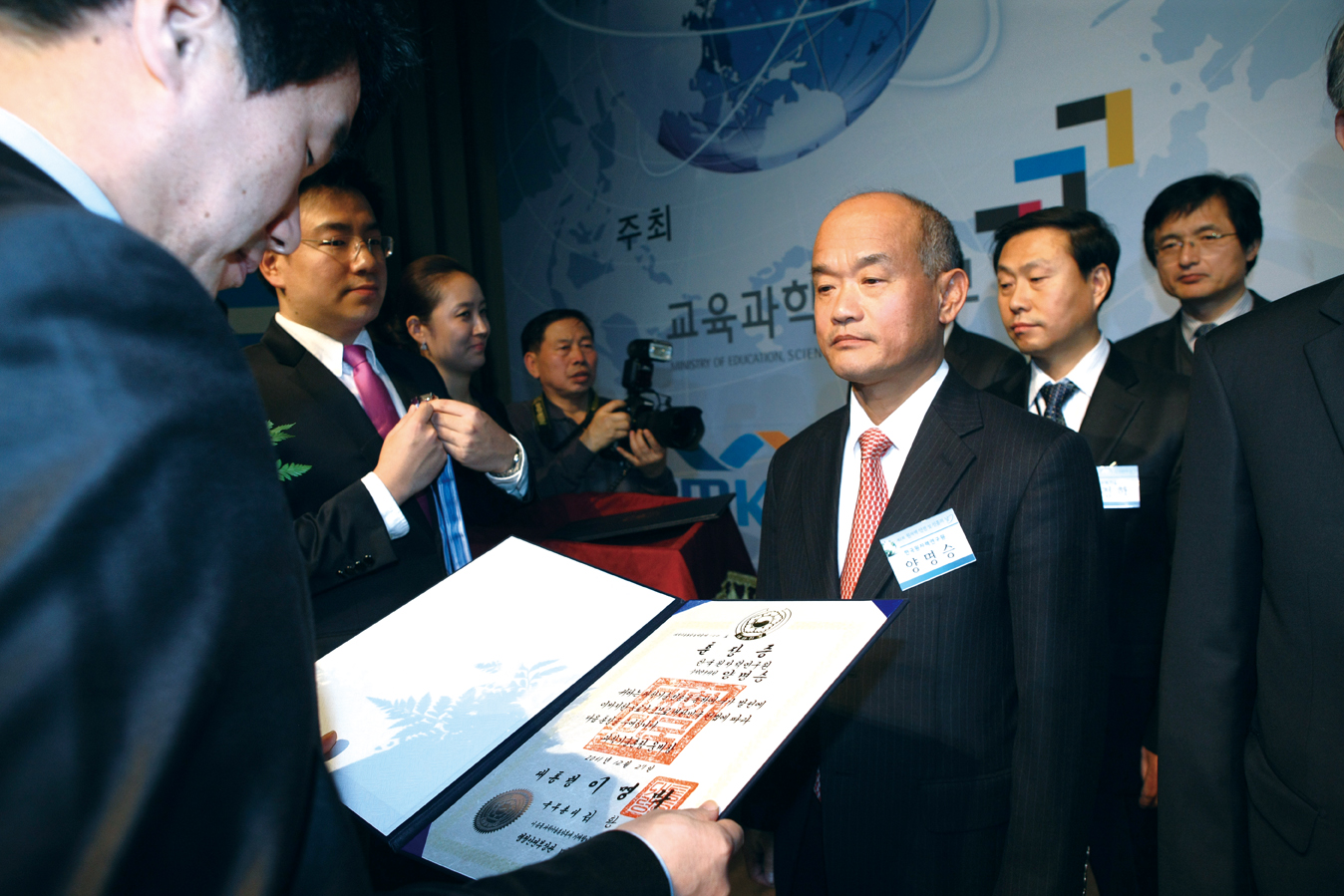Nuclear Safety Day Recognizes Contributions to Jordan Research Reactor
Development of the Korean nuclear power industry


Roughly 300 people in the Korean nuclear power industry assembled at the Korean Federation of Science and Technology Societies (KOFST) Korean Science and Technology Hall in southeastern Seoul on Dec. 27 to celebrate the 2nd Nuclear Safety & Promotion Day.
Among those on hand at the anniversary event, which coincided with a seminar on the enhancement of nuclear power safety were Minister of Education, Science and Technology (MEST) Lee Ju-ho; Vice Minister of Knowledge Economy Cho Seok; Korea Atomic Energy Research Institute (KAERI) President Jung Young-ho; Korea Electric Power Corp. President Kim Joong-kyum; Korea Hydro and Nuclear Power Co. President Kim Jong-shin,; KEPCO E&C President Ahn Seung-kyoo,; KEPCO KPS President Tae Sung-eun,; KEPCO NF President Kim Ki-hak,; and Korea Nuclear Energy Promotion Agency Chairman Chun Byung-tae.
The Order of Science and Technology Service Merit, Woongbi Medal, went to former KAERI president Yang Myung-seung and Ha Jae-ju, vice president of KAERI Advanced Reactor Development Institute, for their contributions to exporting a research reactor to Jordan. At the event, the government presented orders and other prizes to a total of 209 individuals and two organizations who played roles in exporting a research reactor to Jordan or have in other ways contributed to the promotion, use and safety of nuclear power.
SEMINAR ON NUCLEAR SAFETY
Song Chul-hwa, a department chief of KAERI's Nuclear Safety Research Headquarters, gave a lecture at the seminar in which he called for a shift in the nuclear power R&D paradigm to a knowledge-based, advanced R&D system. On the topic titled "R&D Strategy to Dramatically Enhance the Safety of Nuclear Power," he called for a shift to an R&D system on nuclear safety corresponding to the standing of a nuclear power exporter, departing from the government's existing one designed to maximize research outcomes.
The five-year nuclear power development plan, launched in 2007, has focused on maximizing the performances of nuclear power cooling and other projects to advance the development of nuclear power technologies, but from next year on, the R&D strategy will shift to research on safety to ensure knowledge-based decision-making. In an effort to cope with serious nuclear accidents, KAERI plans to develop equipment such as hydrogen control, pressure control and measuring instruments. It also plans to establish a high-precision comprehensive analysis system on the spread of radioactive materials, exposure, and genetic effects. In particular, Korea, Japan, China, and Taiwan have decided to build a regime to evaluate the safety of core parts of nuclear units and an emergency response system to conduct a prior analysis of the core parts. Korea will also put forth its fullest efforts to reduce human error and enhance accident response capabilities by developing robots for use in extreme situations.
Nearly half of Koreans said they believed in the safety of nuclear power units in operation in Korea, according to a public survey conducted by the Science and Technology Policy Institute on the heels of the latest nuclear accident in Japan.
The survey showed that 49.6 percent of the respondents said the nuclear units across the nation are safe, while 27.5 percent replied they worried about their safety and 23.0 percent said they were somewhere in the middle on the matter. By sex, men who replied "safe" stood at 66.3 percent, higher than women. The corresponding figures were 59.7 percent among those in their 50s and 66.7 percent among those in their 60s, significantly higher than 43.1 percent among those in their 20s and 34.9 percent among those in their 30s.
But regarding the question about the government's steps to enhance nuclear safety, 38.2 percent of the respondents said they were insufficient, compared to 36.1 percent who said they were proper. As to the outcomes of the government's safety checks into nuclear units, 34.9 percent said they have confidence, compared to 31.0 percent who cited distrust. Concerning the government's plan to ramp up the portion of electricity coming from nuclear power, 46.6 percent said they agreed with it, compared with 35.2 percent who expressed opposition.
Choi Jong-bae, director general in charge of strategic technology development at MEST, said raising public confidence in nuclear power by establishing dramatic nuclear safety measures is the foremost task, and this will be contained in the upcoming fourth comprehensive nuclear power promotion plan. nw
(left) Two researchers at the Korea Atomic Energy Research Institute (KAERI) read a pledge to ensure nuclear power safety on behalf of the Korean nuclear power community before Minister of MEST Lee Ju-ho. Ex-KAERI president Yang Myung-seung is awarded with the Order of Science and Technology Service Merit, Woongbi Medal in recognition of his contribution of exporting a research reactor to Jordan.
3Fl, 292-47, Shindang 6-dong, Chung-gu, Seoul, Korea 100-456
Tel : 82-2-2235-6114 / Fax : 82-2-2235-0799